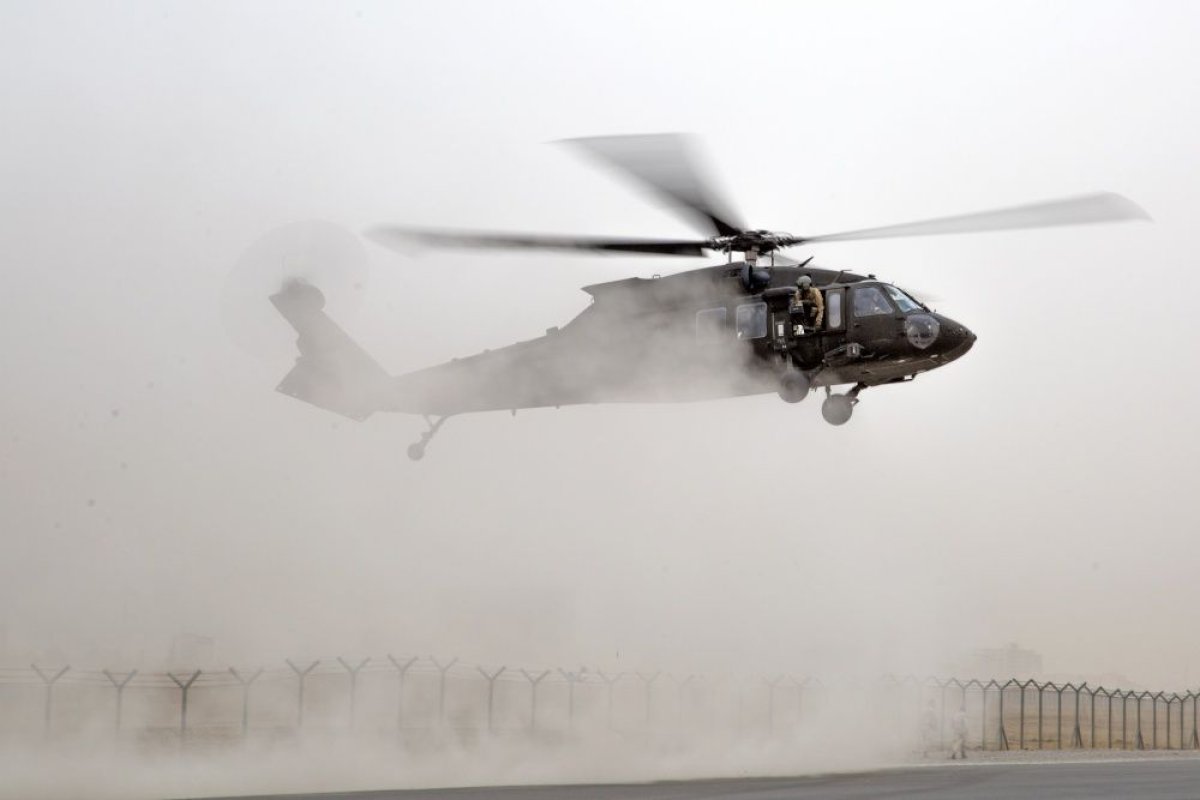An American special operations helicopter crashed early Monday morning in Iraq, killing one U.S. service member and injuring several others, Newsweek has learned.
It is unclear why the MH-60 Blackhawk went down, but U.S. military sources with knowledge of the crash said the helicopter was returning to base after conducting a partnered small-scale raid on Islamic State militants in an undisclosed region as apart of ongoing counterterrorism operations.
U.S. Army Colonel Sean Ryan, spokesman for Combined Joint Task Force-Operation Inherent Resolve, confirmed that an aircraft crashed, but had no further information to provide. Officials said an investigation is already underway.
One official told Newsweek on condition of anonymity that the crash was likely a mechanical malfunction, adding that there was no ground fire when the aircraft went down. Colonel Ryan later confirmed that aircraft was not engaged by enemy forces.
Ten U.S. military personnel were onboard the aircraft being flown by U.S. Army pilots from the elite 160th Special Operations Aviation Regiment, known as the Night Stalkers. An official told Newsweek that one U.S. service member was killed, and three others were medically evacuated to Baghdad—two military members were classified as "continuing mission," meaning they had either light injuries or no injuries and could return to full duty. Stars and Stripes first reported that an American service member had been killed after Newsweek broke the story early Monday morning.
The press statement from Combined Joint Task Force-Operation Inherent Resolve lists the time of crash at 10 p.m. Greenwich Mean Time on Sunday August 19, meaning, that the time of crash in Iraq occurred at 1 a.m. on Monday August 20.
Further details and the name of the deceased service member is being withheld until next-of-kin notification per Pentagon procedures.
Search and rescue operations have been completed, and officials are in the process of recovering the airframe of the helicopter. Defense Department regulations mandate a 12-hour safety stand-down before resuming normal operations. There was no indication that the stand-down would be extended.
"Our heartfelt condolence to the family of @CJTFOIR service member who died in a helicopter crash in #Iraq last night," Colonel Ryan later wrote in a tweet. "While the incident was not a result of enemy fire, it further demonstrates the sacrifices of #Coalition service members & and the danger they face everyday."
U.S. military forces operate out of western Iraqi bases; one is located outside Qaim, and the other is at Al-Asad air base, about 100 miles west of Baghdad. The latter base is the larger of the two and houses a logistics center.

Monday marked the second downing of a U.S. military aircraft in Iraq. Five months earlier, seven U.S. service members were killed after a HH-60 Pave Hawk helicopter struck a power line in Iraq's western Anbar province in the town of Qaim, near the Syrian border.
The MH-60 Blackhawk used by the 160th Special Operations Aviation Regiment is a significantly upgraded version of the iconic aircraft that has been in regular use since the late 1970s. The aircraft can accommodate a variety of missions, such as transportation, aerial reconnaissance and medical evacuation flights.
The 160th is the primary aviation unit of the U.S. Special Operations Command. The regiment gained national prominence after the unit was highlighted in the book Black Hawk Down, which was later made into a feature film.
Since the 2001 invasion of Afghanistan, the Night Stalkers have carried out missions in direct support of special mission units ranging from 1st Special Forces Operational Detachment-Delta, known to the public as Delta Force, and Naval Special Warfare Development Group, commonly referred to as SEAL Team Six.
The latest crash came as a U.S.-led coalition and their Iraqi counterparts continue to defeat the remnants of the Islamic State militant group. Since May, combined Joint Task Force-Operation Inherent Resolve has been continuing clearing operations in the middle Euphrates river valley and Iraqi-Syrian border regions.
ISIS fighters have made a series of efforts to resurge since last year, but the militant group has lost significant manpower and resources as it has been driven from all urban centers it once controlled in Iraq. Members of ISIS have since taken to the vast desert region along the border in order to evade capture or death.
U.S. Central Command, headquartered in Tampa, Florida, has military jurisdiction within Iraq, Syria and Afghanistan. U.S. Army Colonel Robert Manning, who serves as the director of defense press operations, told a Defense Department news publication on Monday that there are about 5,200 U.S. troops in Iraq, with 2,000 operating in Syria. Afghanistan, the site of America's longest ongoing conflict, has 14,000 U.S. service members deployed to the region.
This story has been updated after the Pentagon confirmed to Newsweek that the service member killed in the helicopter crash was an American.
Uncommon Knowledge
Newsweek is committed to challenging conventional wisdom and finding connections in the search for common ground.
Newsweek is committed to challenging conventional wisdom and finding connections in the search for common ground.
About the writer
James LaPorta is a senior correspondent for Newsweek covering national security and military affairs. Since joining the magazine, Mr. LaPorta has extensively ... Read more
To read how Newsweek uses AI as a newsroom tool, Click here.








